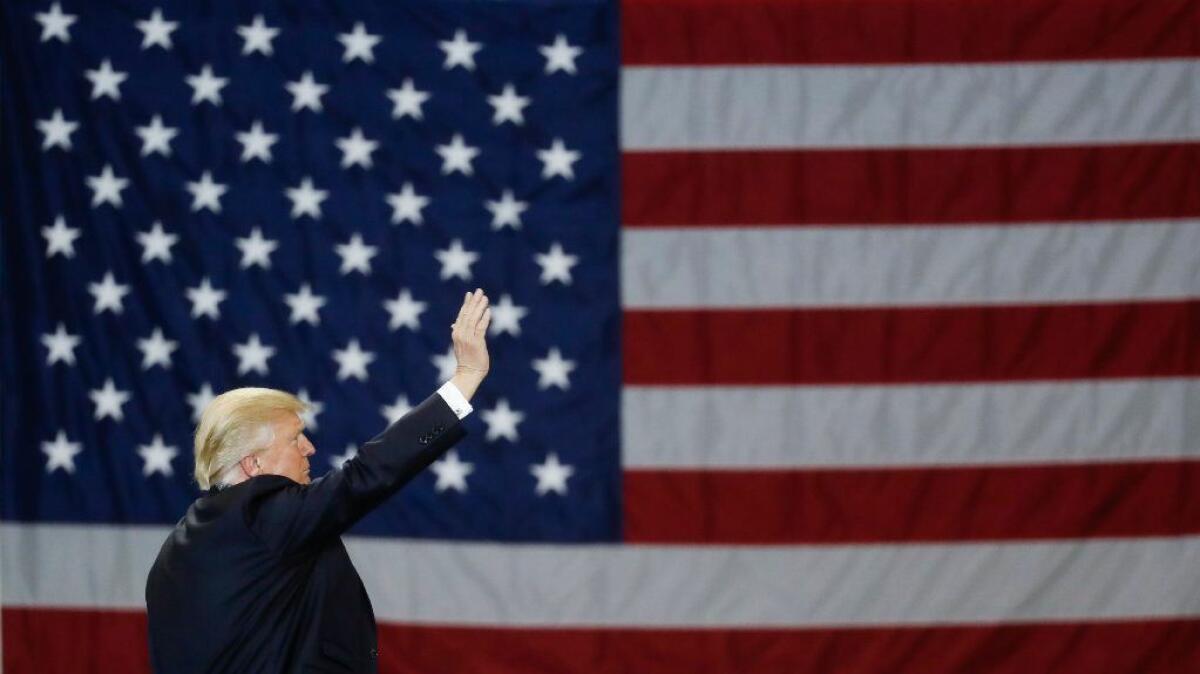Opinion: Trump and the flag: Is it respect he demands or worship?

- Share via
Questions about Donald Trump’s religious beliefs — or lack of them — have haunted him since he emerged as a presidential candidate. Trump himself said in 2015 that “people are so shocked when they find … out I am Protestant. I am Presbyterian. And I go to church and I love God and I love my church.”
The doubters might have felt vindicated by a comment in the same forum in which Trump responded to a question about whether he asked God for forgiveness.
“I don’t think so,” he told political pollster Frank Luntz. “I think if I do something wrong, I think, I just try and make it right. I don’t bring God into that picture. I don’t.”
On the other hand, Trump added: “When I drink my little wine — which is about the only wine I drink — and have my little cracker, I guess that is a form of asking for forgiveness.” Not the way most Christians refer to Holy Communion (though more reverent than the fictional hippie priest’s chant during a folk Mass of “Pizza and beer, Jesus is here!”).
But Trump’s weekend denunciation of NFL players who “take the knee” during the national anthem suggests that his religion might also include something akin to flag worship.
Granted, when Trump talked about “worship” in his campaign speech in Alabama on Friday it was worship of God. (“We do not worship government, we worship God.”) By contrast, he criticized some NFL players for showing mere “disrespect” for the flag. In a follow-up tweet, he said, “The issue of kneeling has nothing to do with race. It is about respect for our Country, Flag and National Anthem. NFL must respect this!”
But by “respect” Trump clearly means something more like “veneration.” In his speech, he asked the crowd, “Wouldn’t you love to see one of these NFL owners, when somebody disrespects our flag, to say, ‘Get that son of a bitch off the field right now?’ ”
Given such language, I’d be surprised if Trump had a problem with the term “flag desecration.” In November, apparently after seeing a Fox News report about a flag-burning on a college campus, then-President-elect Trump tweeted: “Nobody should be allowed to burn the American flag — if they do, there must be consequences — perhaps loss of citizenship or year in jail!” You don’t put people in jail or strip them of their citizenship for mere disrespect.
Trump seemed unaware that laws against flag burning — commonly called flag desecration laws — were declared unconstitutional by the Supreme Court twice, in 1989 (at the state level) and in 1990 (at the federal level).
The rationale for those decisions was that the laws violated the 1st Amendment’s guarantee of free speech because burning the flag as a political protest was “expressive content.” But it’s revealing that the Texas statute under which Gregory Lee Johnson was convicted for burning the American flag in the 1989 case was “Desecration of Venerated Object.”
An alternative, admittedly eccentric, way to look at that law is that it was an unconstitutional establishment of religion: the religion of flag worship.
In that connection, it always stuck me as notable that all three Catholics on the Supreme Court at the time — Antonin Scalia, a conservative, William Brennan, a liberal, and Anthony Kennedy, a swing vote — were in the majority in striking down laws against flag desecration. As Catholics they were taught that sacred objects were found in church, not on a football field or a battlefield.
Me too. I had been scandalized as a boy when I wandered into an Episcopal church and saw an American flag in the sanctuary. I was shocked by the idea that a secular symbol, even one as important as the American flag, could be considered a sacred object, enshrined in the same place where the body of Christ — or as Trump would put it, the “little cracker” — was consecrated and consumed.
Trump’s riffs on “taking the knee” can be interpreted in a lot of ways — my colleague Cathleen Decker makes an intriguing argument that they are part of an appeal to white grievance. But don’t discount the faith factor in his defense of Old Glory.
Follow the Opinion section on Twitter @latimesopinion and Facebook
More to Read
A cure for the common opinion
Get thought-provoking perspectives with our weekly newsletter.
You may occasionally receive promotional content from the Los Angeles Times.










